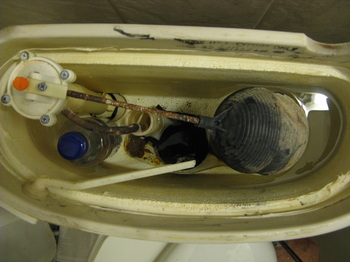|
In the environmental science class that I teach, one of the assignments is for the students to calculate their ecological footprint, write a response on it, and choose one action to change for the next two weeks. I always love reading these assignments! It's later in the semester, so students have learned more or less where their food and energy comes from, a little about global water issues, and are generally more aware about environmental issues than when they started. Some students are surprised, or horrified even, when they learn that if everyone lived the way they did, we would need four or six earths. Some aren't - they assumed that their lifestyle was pretty average, and by now we've learned in class that Americans generally produce more waste and use more oil per capita than most other countries. For their two week lifestyle change, some students usually choose to go vegetarian (some had always been curious what it would be like, or if they could even do it for so long). Some students decide to take shorter showers (from 30-45 minute showers down to 6 minute showers)...I don't even know how you can take a 45 minute shower. Sometimes students find these actions fairly easy, and feel that they can adopt it somewhat permanently into their life, but I'm sure that many students just take it as an experiment. Either way, this is the best way that I can come up with to challenge the students to try a change to reduce their impact. And for myself? I also do the assignment (but I don't have to do the writeup! The perk of being a teacher). My ecofootprint has very slowly decreased over the past two years, as I've found new ways to use less. For the past assignments, I've stopped using a clothes dryer at home (I installed a pretty sketchy looking clothesline in my room), asked my landlord to turn down the heat (this was not successful, but now we have our own thermostat so I can keep the apartment a chilly 18 all winter long. I have lots of fluffy socks), and joined a community supported agriculture (from Lufa, the amazing Montreal-based rooftop greenhouse). I have to say that joining a CSA probably made the biggest impact, since all winter long I've been eating more in season (I never want to eat another freaking beet or turnip again) and since it's all local and organic, I think I've cut down on my pesticides and transportation. This year, I decided to reduce my water consumption. I had a few goals for my two weeks: 1) put a full bottle in the toilet tank to reduce the amount of water used for flushing every time 2) FINALLY change the low- flow showerhead that I got for my birthday two years ago (I know, I ask for very exciting birthday presents) 3) fix all the damn leaky faucets in my apartment It was pretty easy to put a full water bottle in my toilet tank, once I figured out how to put it in there it without knocking into anything. Surprisingly, my toilet still works totally normally, and I'm sure you can't notice that there's less water used for flushing.  Same with the low-flow showerhead. It was hard to unscrew the old showerhead, so I had to convince my brother to come over with some tools to change it. I thought at first that it would be a little unpleasant to shower with less water, but I can't really tell the difference, and it saves tons of water. My last goal was to fix all my leaky faucets myself. I asked for help on this one too, but I could only turn the water off for one of the faucets. I did fix one leak, but I couldn't fix the others. Those will have to wait. In the meantime, I think I'm saving a lot of water with my low-flow showerhead and my home-made low-flush toilet.
1 Comment
Your comment will be posted after it is approved.
Leave a Reply. |
About ShonaI'm an eco-conscious girl from Montreal, Quebec. I'm currently an adjunct science professor at Champlain College of Vermont (Montreal Campus). I'm interested in any opportunities to expand my experience with grassroots activism, climate change legislation, or environmental education. Archives
March 2016
Categories
All
|


 RSS Feed
RSS Feed
